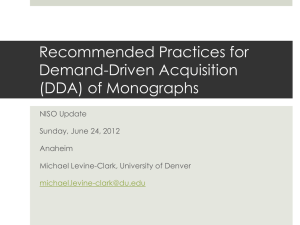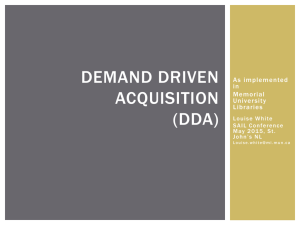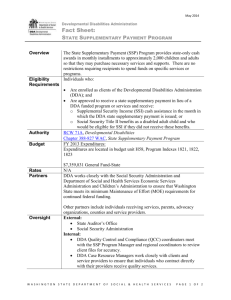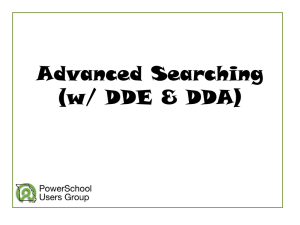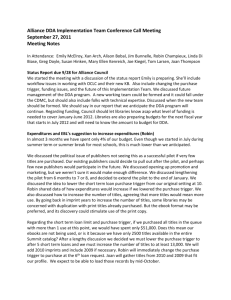DDA pilot project in Religious Studies and History – University of
advertisement
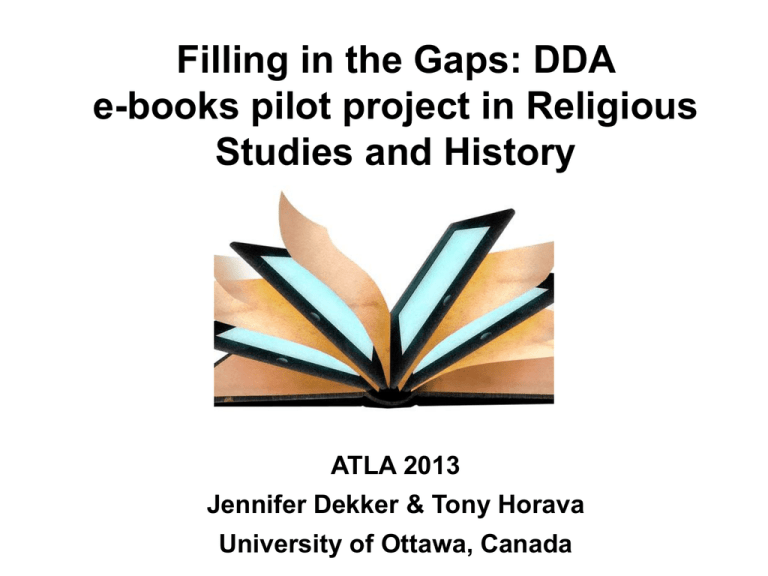
Filling in the Gaps: DDA e-books pilot project in Religious Studies and History ATLA 2013 Jennifer Dekker & Tony Horava University of Ottawa, Canada Outline • University of Ottawa introduction • The Library – a snapshot • Collection development strategies for books • Setup issues and challenges • History & Religious Studies departments • Project goals • Project analysis University of Ottawa – located in Canada’s capital University of Ottawa – a snapshot • • • • • North America’s largest bilingual university (English/French) One of Canada’s top 10 research universities We are an ARL member (as of 2010) Students and faculty from 150 countries In Fall 2012 : 42,027 students enrolled – 35,700 undergraduates – 6,327 graduates • 10 Faculties: Arts, Social Sciences, Education, Management, Science, Engineering, Common Law, Civil Law, Health Sciences and Medicine. • Four libraries ( Arts & Sciences, Health Sciences, Law, Management) The Library – by the numbers • Collection budget: 15.7M (2013/14) • About 60% dedicated to serials & other ongoing commitments • 160 FTE staff: 45 Librarians and 115 administrative staff • 25,095 journal subscriptions • 94,045 accessible journals • 2,247,148 print books • 727,610 Ebooks • 745 research databases • ~100,000 books & other items acquired 2012-13 Library strategy for books • A mix of parallel approaches : • • • • • Frontlist agreements with major publishers for ebooks; Print books on approval; Ebooks on approval (e-preferred plans); Print and and ebooks as firm orders; Subscription to ebook collections where appropriate (eg Computer science) • Consortial opportunities in Canada • Demand-driven opportunities Relationship with YBP • Principal book vendor since 2004; the result of a multiyear approval plan pilot process with several vendors • We buy US, UK, English Canadian, and other English books worldwide from YBP • Approval plans in all disciplines: Humanities, Social Sciences, Science and Engineering, Law, Medicine, etc. • Ratio of firm orders to approvals: 60/40 • 50% of total purchases are from YBP and arrive Shelfready; MARC records received from OCLC • Each subject librarian manages his or her own profile; non-subject parameters are set at the plan level. Initial decision-making for project… • Choice of platform : ebrary • Choice of format: ebook rather than p book • Purchase rather than short-term rental • SUPO (single user purchase option) • Choice of payment mode: deposit account • Special fund account • Funding from the Morisset Library (Arts and Sciences) book budget. Initial decision-making (cont’d) • Integration with existing approval plans was important; automatic books would still arrive • The new DDA plan was carved out of the slips portion of the YBP approval profile • The creation of a retrospective pool of matching titles was crucial for the goals of this project: no cut-off date (except de-duplication only done on last 5 years of holdings). DDA Trigger events Any of these activities: - User views the content of one ebook for ten consecutive minutes, or - User views ten unique pages of one ebook, or - One page (or portion thereof) of an ebook has been copied or printed. Setup issues • De-duping essential: • Block publishers with whom we have blanket agreements for frontlist ebook coverage; and block what we acquired via consortial purchase (OCUL* PDA pilot in 2010 and CRKN** purchase in 2008); • We use YBP Library Holdings Load Service for duplication detection (5 years of holdings); • Update loading was done - it is now done on a monthly basis with our OCLC reporting. • *Ontario Council of University Libraries (provincial) • ** Canadian Research Knowledge Network (federal) Setup issues (loaders) • We created a discovery loader that matches on the title aggregator (ebrary) number in the 001 field and discards discovery records that match our holdings - to take into account the lack of, or unreliability, of ISBNs. • Ebrary records do not have an ISBN 020 field (stripped out by the vendor during the batch record creation) but they do have a 001 field (aggregator title number). • We decided to report only for the last 5 years of holdings • A point-of-invoice loader created to replace the discovery records for triggered titles with full records by matching on the 035 field (ebrary) • Librarians are able to recognize a DDA title in the catalogue, via the fund code and vendor code in the MARC record and distinctive call number. Logistics for implementation • Many duplicates were discarded when we sent YBP our ISBN lists and they set our holdings in GOBI; • In addition when we loaded the large file of DDA records, 4,850 were loaded, 923 were rejected (dups) by the discovery record loader leaving 3,927 base titles in the pool; • About 40 new records added per week to the pool; • A total of 5,982 discovery records loaded during the project period. Timelines Initial interest in DDA plan: •July 2011 Discussion with YBP and ebrary re: logistics and decisions: •Sept-Oct 2011 DDA profile created; initial pool of titles; Acq. profile setup: •Nov. ’11 Discovery & overlay loaders created and loading done; cleanup of files: •Feb.March 2012 Launch! •March 27, 2012 Basic workflow – Part 1 Step 1 •Alert sent weekly to Ebooks Cataloguer for ‘Discovery’ records matching DDA profile Step 2 •Records loaded to the catalogue Step 3 •Trigger event occurs Step 4 •Report sent to Ebooks cataloguer & Acquisition Service for purchased titles Basic workflow – Part 2 Step 5 Step 6 •MARC records •Point of given a invoice records different call are loaded and number for overlay the identification ‘Discovery’ (Ebrary records ebooks) Step 8 •Payment made •The process by Acquisitions repeated itself weekly staff Step 7 Part II 17 Faculty/ Graduate Feedback 1. Lack of historical monographs (due to low funding especially in the 1990’s) 2. French language collection deficiencies; 3. Little consultation in terms of what was being collected; 18 U of Ottawa DDA e-book project Goals Focus on faculty members and graduate students 1. Lack of historical monographs (!!!) 2. Test current collection development policies 3. Test desirability of e-books 4. Build relationship with stakeholders. DDA ebrary weekly report PDA data adapted from Walters’ 2012 study* University Date Vendor Titles Available Titles Bought / Month Price / Title Cost /year Southern Illinois U. 2009 Coutts 8,453 26 $115 $35,995 U. of Florida 2009 Coutts 5,000 32 $107 $41,302 U. of Iowa 2009 ebrary 13,000 72 $103 $88,889 U. of Vermont 2007 YBP 1,502 49 $64 $37,760 U. of York 2009 Springer 3,000 36 $83 $35,939 U. of Ottawa 2012 YBP/ebrar 5,982 y 41 $100 $49,200 *Walters, William H. (2012). “Patron-Driven Acquisition and the Educational Mission of the Academic Library.” Library Resources & Technical Services 56(3) 199-213. Difference in percentage between DDA selections and librarian selections at the University of Ottawa Difference in percentage between DDA selections and librarian selections at the University of Ottawa Overview of DDA selections 615 total selections ~ 20% not related to History or Religious Studies 497 total selections in target areas: ---- 40.4% Religious Studies ---- 59.6 % History Titles Selected in Religious Studies: Broad Subjects Subject Number of Titles Selected Christianity (incl. Theology, Biblical studies) 75 (37%) Judaism 36 (18%) Ancient / Late antique (Judeo-Christian) 17 (8.5%) Islam (All time periods) 14 (7 %) Buddhist 11 (5.5%) Sociology of Religion 9 (4.5%) Medieval 8 (4%) Psychology of Religion 6 (3%) Hindu 3 (1.5%) Indigenous Religions 2 (<1%) Other (NRM, Interfaith dialogue, General) 20 (10%) DDA Titles: Major Publishers Publisher Number of Titles Selected ABC-Clio (almost 100% History) 70 Brill (~ 75% Religion) 58 (avg. price $191 / title) Palgrave-MacMillan 40 Continuum (almost 100% Rel.) 32 (avg. $132 / title) Greenwood (almost 100% His.) 23 Routledge 22 Various University Presses 49 Average title = $100.04 DDA titles: Smaller Publishers Publisher Number of Titles Selected Pluto Press (independent) 10 (generally in D, F) I.B. Tauris 8 (4 Religious Studies, 4 History) Mohr Siebeck 8 (Religious Studies) Zed 4 (History) Jewish Publication Society 4 (2 Religious Studies, 2 History) Purchase triggers U of Ottawa: Printing = 30 Copying = 64 Chapter Downloads = 103 Viewing (> 10 minutes) = 306 Emily Chan and Susan Kendall (ACRL Conference, April 2013) reported similar triggers at San Jose State. Ohio State project had a very low trigger and purchased 4,400 titles per year = 370 per month. Were historical titles selected? Out of 497 titles in History and Religious Studies: • 203 titles were published before 2005 (40.8%). •Oldest title selected published 1951. • Of the pre-2005 titles, 50% were in Religious Studies. • Of those published pre-2005, 52 were published before 2000 (25%). • Of the 497 titles selected, 294 were published after 2005. (59.2%). The community selected a reasonable proportion of historical titles. Interlibrary loans during the project period Religious Studies (75 ILL requests by professors and grad students) NON-ENGLISH - 34 (45.3%) PUBLICATION DATE PRE-1950 - 8 (10.6%) No effect on DDA History (108 ILL requests by professors and grad students) NON-ENGLISH - 36 (33%) PUBLICATION DATE PRE-1950 - 35 (32.4%) No effect on DDA Survey responses 18 completed responses: - 28% faculty (5) , 72% graduate student (13). - 50% Religious Studies, 50% History. - 11% French (2), 89% English (16) Survey results • 11 had noticed an increase in historical e-books in the catalogue. • 10 indicated that historical gaps are still a problem. 8 said that there was no problem with historical titles. • 11 respondents indicate that e-books are an acceptable format for studies in their subject area. • 6 indicated that they prefer print materials for their research and study area. • Reasons for e-book / print preference focused on reader likes / dislikes, not on what is available in either format. Survey results • 75% or 12 respondents felt that the balance between print and e-books in the library today is acceptable. • Only 8 respondents indicated that they valued the availability of DDA e-book records in the catalogue, available to purchase at any time. 10 respondents either didn’t value them or had no opinion. • Although only 2 responses were in French, 8 respondents (44%) indicated that a French language DDA e-book plan would be helpful. Final thoughts: DDA data and survey - E-books are okay! - DDA e-book plan is not going to manage faculty and graduate concerns regarding historical monographs; - ILL-based DDA plan incorporating print and e-books probably more useful; - Demonstrated willingness to include community in selection; - DDA e-book plan filled in “mainstream” academic titles (current and historical) not ordered when originally published; - Current collection policy (Religious Studies) is reflected in DDA selections. Thanks! • Tony Horava thorava@uottawa.ca • Jennifer Dekker jdekker@uottawa.ca
